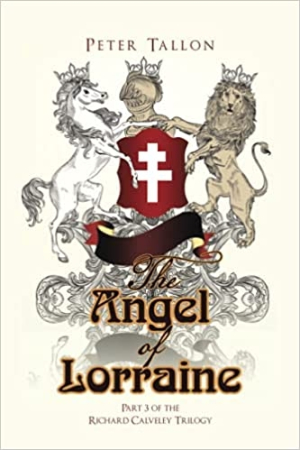The Angel of Lorraine
Part 3 of the Richard Calveley Trilogy
Centering military details, the historical novel The Angel of Lorraine concerns the fights between the English and the French during Joan of Arc’s time.
Peter Tallon’s detailed historical novel The Angel of Lorraine follows Joan of Arc—and her impact on the fifteenth-century war between the French and the English.
In 1428, Joan of Arc (known to the French as Jeanne Darc or Jeanne the Maid of Orléans) is sixteen. Her father informs a parish priest that Jeanne hears voices. The voices have ordered her to lead the army of Charles VII so that he may be crowned king and drive out the English.
After Jeanne gains an audience with Charles, she is given the authority to lead his troops on a series of successful campaigns. In Reims, Charles is anointed with the same holy oil used for the first king of France, just as Jeanne’s voices commanded. But Jeanne’s successes do not last long: she is destined by history to burn at the stake.
Though The Angel of Lorraine focuses on the years between the start and end of Joan of Arc’s career, she is not its central character. The story places greater emphasis on the English and French commanders who play central roles in the war. It conveys their practical impressions of Jeanne without expounding on the religious fervor around her. They are clear witnesses to the major events of the time.
Still, the battles and troop movements are more detailed than the book’s characterizations. A bevy of historical personalities and locales are involved, but no one person is invested in until the introduction of Captain Richard Calveley, an English commoner who is forced to take his wife to France because of her heretical religious views. Calveley develops personal affection for Joan of Arc: she spares his troops and allows him to gather a ransom to pay for their lives. The story follows his doomed attempts to return Joan’s favor—as well as his personal adventures outside of the war.
Also as a result of its scope, the book is not immersed in its period beyond the conveyance of some dialects and details about the culture and landscape. What the people behind the wars truly believed about Joan of Arc is under explored in favor of conversations about geography, characters’ relationships, and the historical conventions of war. A map and a review of what happened to each of the major characters at the end of their lives bookend these didactic presentations.
Centering military details, the historical novel The Angel of Lorraine concerns the fights between the English and the French during Joan of Arc’s time.
Reviewed by
Brandee Gruener
Disclosure: This article is not an endorsement, but a review. The publisher of this book provided free copies of the book and paid a small fee to have their book reviewed by a professional reviewer. Foreword Reviews and Clarion Reviews make no guarantee that the publisher will receive a positive review. Foreword Magazine, Inc. is disclosing this in accordance with the Federal Trade Commission’s 16 CFR, Part 255.

